Jessica Hubbard – 6 March, 2018
Bryce's zines come from feminism, from punk, and from underground comics. But they do not have the teeth of these early practices. They are not raw pain. They are scatological, but they are measured and moderate. They are like, in this case, real life.
Bryce Galloway
Incredibly Hot Sex with Hideous People: Diary Comics
Pikitia Press 2017
Vomit, sex, piles, shit, love, affection, middle-class guilt, kindness, frustration, wrestling, music, diarrhoea, humour, fathering, husbanding, worming the children, making art: these are some of the things that make up Bryce Galloway‘s work: a collection of diary comics gleaned from his zine of the same name, Incredibly Hot Sex with Hideous People.
A disclosure: Bryce was once my tutor and still someone I’m always pleased to see and talk to. I admit there are other ex-tutors I find myself so shy and awkward with I sidle past without catching their eye— I am socially anxious. But Bryce resembles his diary comics, he’s always willing to put himself out there, to have conversations, to connect, to be a bit silly, a bit serious, a bit of an overthinker, a bit awkward, a bit relaxed, quite kind, laughing.
So read this piece with that in mind. That I am fond of Bryce, as fond as I am of any person I like but only ever see casually and don’t in fact know very well.
A diary comic presents as an intimate insight into a person’s life, or an apparently intimate insight at any rate. Diaries have traditionally been private realms in which one writes down ones thoughts, feelings or reflections. Personally—and how can I write otherwise on this—they strike me most commonly as a product of the Romantic period, as an embrace of emotion, as an embrace of the self. In dealing with emotions and the self, personal and private life, diaries have therefore been regarded as somewhat lightweight and feminine, interesting but not serious.
The riot grrl movement, which saw the rise of the perzine, used the zine form to expose the truth and pain of the personal: feminism has not won, rape and abuse is rife, I’m going to tell you how much this has hurt me in my actual life with my actual real emotions. Riot grrls took the slogan, the personal is political, and used the tools of the punk underground to disseminate the impact of the political on the personal. Bryce’s zines are a reflection of this practice. They come from feminism, from punk, and from underground comics. But they do not have the teeth of these early practices. They are not raw pain. They are scatological, but they are measured and moderate. They are like, in this case, real life.
Bryce’s comics in this book centre largely around his family life and to some degree around his working life. Like many early radical feminist artists’ works they expose the balancing act of choosing to be a good parent, a decent spouse, an employee (albeit one employed to some degree to incorporate an arts practice) and an artist. Bryce exposes his white, cisgendered, male, middle class, liberal perspective and lifestyle. He’s (mainly) vegetarian and gluten-free, he usually cycles or buses to work, he lives with a wife, they raise two children, they keep chickens. His life is a busy balancing act of relationships, children, housework, work, and creativity. He highlights something that the early female feminists had less access to, the moral choice to participate in the juggling of family, employment, and creative outputs.
He intelligently and humorously highlights the small domestic disasters, the accidents, the arguments. The humour is definitely punk. The opening comic of Sunday Jan 29, 2012 shows Bryce standing down-trou in front of a toilet, thinking, “Hooray, first solid stools for a week.” At some point his wife protests this eternally punk-negative view and he does a short series of happier moments which both presents a more balanced view of their family life, and also highlights the curated nature of this art. It is good to have a reminder that, much like Facebook and Instagram—although from the opposite direction, this practice is a presentation of reality skewed through art. Everything Bryce makes is a representation not a reality. And everything Bryce presents is a curated representation of that making. The fact that he directly represents his real life as an artwork does not make this any less true; perhaps it makes it more so.
Jess Hubbard
Recent Comments
John Hurrell
Scatological humour is something I often wonder about. I admire it in artists like Robert Crumb, Joe Matt and Julie ...
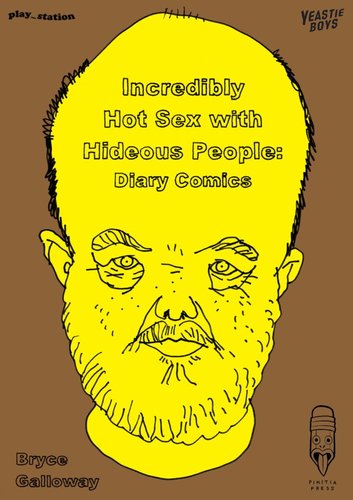
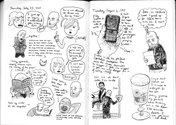
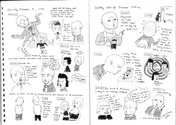
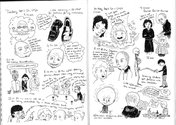

 Advertising in this column
Advertising in this column Two Rooms presents a program of residencies and projects
Two Rooms presents a program of residencies and projects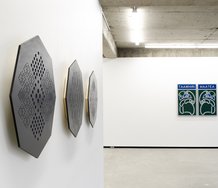
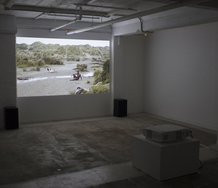
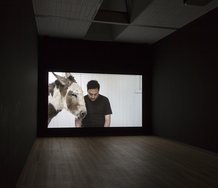

This Discussion has 1 comment.
Comment
John Hurrell, 6:37 a.m. 8 March, 2018 #
Scatological humour is something I often wonder about. I admire it in artists like Robert Crumb, Joe Matt and Julie Doucet, but is it an older generation thing? Surely it's approval or disapproval is not merely a cismale / cisfemale cliche?
Participate
Register to Participate.
Sign in
Sign in to an existing account.